高二牛津模块七第三单元project学案 M7U3 project
- 格式:docx
- 大小:19.74 KB
- 文档页数:2
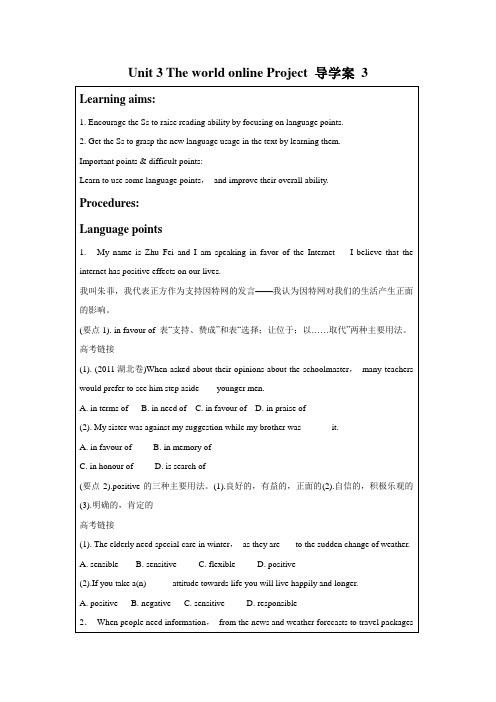
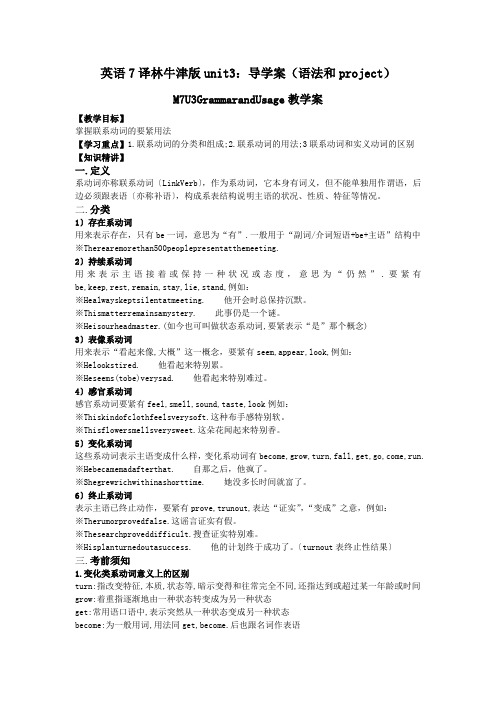
英语7译林牛津版unit3:导学案(语法和project)M7U3GrammarandUsage教学案【教学目标】掌握联系动词的要紧用法【学习重点】1.联系动词的分类和组成;2.联系动词的用法;3联系动词和实义动词的区别【知识精讲】一.定义系动词亦称联系动词〔LinkVerb〕,作为系动词,它本身有词义,但不能单独用作谓语,后边必须跟表语〔亦称补语〕,构成系表结构说明主语的状况、性质、特征等情况。
二.分类1〕存在系动词用来表示存在,只有be一词,意思为“有”.一般用于“副词/介词短语+be+主语”结构中※Therearemorethan500peoplepresentatthemeeting.2〕持续系动词用来表示主语接着或保持一种状况或态度,意思为“仍然”.要紧有be,keep,rest,remain,stay,lie,stand,例如:※Healwayskeptsilentatmeeting. 他开会时总保持沉默。
※Thismatterremainsamystery. 此事仍是一个谜。
※Heisourheadmaster.(如今也可叫做状态系动词,要紧表示“是”那个概念)3〕表像系动词用来表示“看起来像,大概”这一概念,要紧有seem,appear,look,例如:※Helookstired. 他看起来特别累。
※Heseems(tobe)verysad. 他看起来特别难过。
4〕感官系动词感官系动词要紧有feel,smell,sound,taste,look例如:※Thiskindofclothfeelsverysoft.这种布手感特别软。
※Thisflowersmellsverysweet.这朵花闻起来特别香。
5〕变化系动词这些系动词表示主语变成什么样,变化系动词有become,grow,turn,fall,get,go,come,run. ※Hebecamemadafterthat. 自那之后,他疯了。

Unit 3 Project Doing Research on the InternetTeaching aims:Encourage students to practise their English by completing a project.Important & difficult points:1.Read an information sheet about Internet research.nguage points in the text.3.Students use what they have learnt to finish a project by working together.Teaching procedures:Step 1 RevisionStep 2 Lead-in of the reading passage1. Ask students to work in pairs to siscuss the steps they follow when they research information on the Internet. Ask them to write down what they do step by step.2. Ask two or three pairs to present their ways of researching information to the class.Step 3 ReadingAsk students to read the article in Part A with the help of the following table.Step 4 Language points1.guiden.领路人,导游者,引导者,指南a guide book导游指南A guide led us around the city.向导带我们到市内各地去游玩。
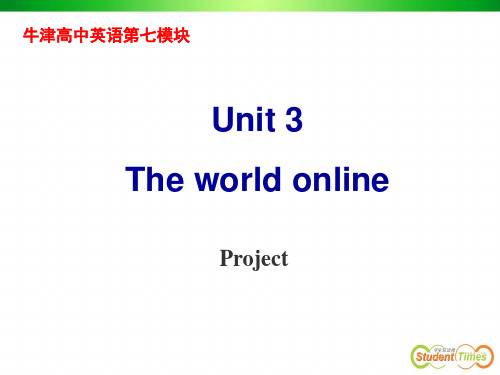
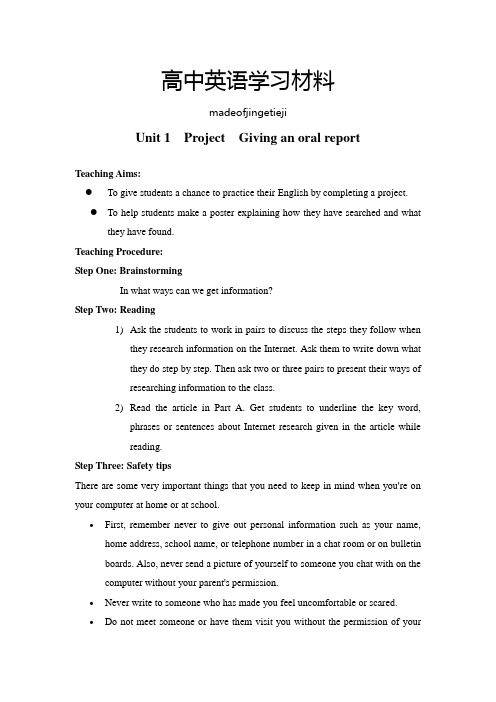
高中英语学习材料madeofjingetiejiUnit 1 Project Giving an oral reportTeaching Aims:●To give students a chance to practice their English by completing a project.●To help students make a poster explaining how they have searched and whatthey have found.Teaching Procedure:Step One: BrainstormingIn what ways can we get information?Step Two: Reading1)Ask the students to work in pairs to discuss the steps they follow whenthey research information on the Internet. Ask them to write down whatthey do step by step. Then ask two or three pairs to present their ways ofresearching information to the class.2)Read the article in Part A. Get students to underline the key word,phrases or sentences about Internet research given in the article whilereading.Step Three: Safety tipsThere are some very important things that you need to keep in mind when you're on your computer at home or at school.∙First, remember never to give out personal information such as your name, home address, school name, or telephone number in a chat room or on bulletin boards. Also, never send a picture of yourself to someone you chat with on the computer without your parent's permission.∙Never write to someone who has made you feel uncomfortable or scared.∙Do not meet someone or have them visit you without the permission of yourparents.∙Tell your parents right away if you read anything on the Internet that makes you feel uncomfortable.∙Remember that people online may not be who they say they are. Someone who says that "she" is a "12-year-old girl" could really be an older man.Step Four: Making a poster1)Ask the students to work in groups to discuss the questions in Part B.They should choose a topic to research on the Internet and then dividethe work among the group members.2)Ask each group to present their poster to the class. Other groups cangive their comments. Encourage students to decide which group hadmade the best use of the Internet and has found the true and accurateinformation.Step Five: Important phrases1. do research on2. the more… the more…3. keep in mind4. be based on5. ask for6. right away7. make a decision8. up to dateat the bottom of10. be careful about11. be (not) sure about12. make a difference13. search for14. belong to15. make a list of16. follow these tipsStep Six: Homework1. Finish the poster2.Do exercises on P 119 in th workbook.。
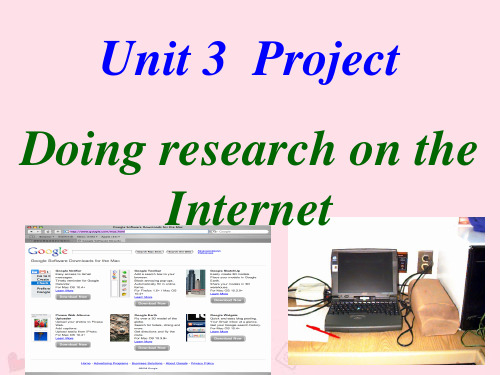
Unit 3 The world online Project 教学设计12. It will help you when your group does research on a topic on the Internet. (P46)researchn. [U] a detailed study of a subject,especially in order to discover (new) information or reach a (new) understanding:scientific/medical researcha research student/assistant/laboratoryThey are carrying out/conducting/doing some fascinating research into/on the language of dolphins.v. [I or T]She's researching into possible cures for AIDS.Journalists were frantically researching the new Prime Minister's background,family and interests.3. The contents they search have not been evaluated. (P46)evaluatev. [T] to judge or calculate the quality,importance,amount or value of sth.:It's impossible to evaluate these results without knowing more about the research methods employed.[+ question word] We shall need to evaluate how the new material stands up to wear and tear. 4. The links you obtain from the search engine go to the full articles or pages. (P46)obtainv.[T] FORMAL to get sth.,especially by asking for it,buying it,working for it or producing it from sth. else:to obtain permissionFirst editions of these books are now almost impossible to obtain.In the second experiment they obtained a very clear result.Sugar is obtained by crushing and processing sugar cane.v. [I not continuous] FORMAL (especially of a situation) to exist:Conditions of extreme poverty now obtain in many parts of the country.[5. This requires you to be patient as you have to read the information to decide whether it is related to what you are researching. (P46)requirev. [T] to need or make necessary:Please telephone this number if you require any further information.Skiing at 80 miles per hour requires total concentration.[+ object + to infinitive] Bringing up children often requires you to put their needs first.You are required by law to stop your car after an accident.[+ that] The rules require that you bring only one guest to the dinner.asadv. 象…一样;如同;一样;同样like;in the same wayHis face is as black as coal.I am not as tall as he is.It seemed to be as big as a house.He thought he could walk as quickly as his friend,but couldn't.I get up just as early as he does.as cold as iceas cool as a cucumberas good as goldas happy as a larkconj. 1) 当…的时候when;whileHe waved as the train left the station.As I was coming here,I met your brother.As a child he lived on a farm.We get wiser as we grow old.2) 和…一样;象;如in the same way asDo as I do.It is just as you like.We discussed our profession as all medical men do. It isn't so (as) easy as you think.This line is as long as that one.He doesn't speak as other people.3) 按照according toHe told his men to do as the boy asked.Do as you are told.It is as you told me.4) 表示比例、比拟等Two is to four as (what) eight is to sixteen.One is as light as the other is heavy.5) 因为;由于;鉴于becauseAs I was late,I hurried along.As it was raining,I stayed at home.As Li Pin was not well,I went there myself.As he wasn't ready,we left without him. Everybody likes him as he is kind and honest.6) 虽然;尽管;然而though;howeverYoung as he is,he knows a lot of things.Pretty as she is,she is not clever.Late as it was,they continued the work.Rich as he is,he is not happy.Cold as it was,they went on working.7) 被认为;作为considered asHe was famous as a soldier.He was hanged as a murderer.prep. 1) 以…为职业in the job ofMarion works as a journalist.2) 以…的资格;作为in the capacity of;considered asHe is famous as a physicist.I regard him as a guest.I've come here as a journalist.pron. 1) 象…那样的人(或事物) the same as;as... as;such... asHe is not such a fool as he looks.Is it the same lecture as tomorrow's?He is not the same man as he was.2) 由…知道(preceded by,or preceding a sentence) which factHe was a foreigner,as I knew from his accent.This elephant is like a snake,as anybody can see.高考链接1. Jenny was very sad over the loss of the photos she had shot at Canada,_________ this was a memory she especially treasured. (2006广东)A. asB. ifC. whenD. where2. __________,he talks a lot about his favorite singers after class. (2005重庆)A. A quiet student as he may beB. Quiet student as he may beC. Be a quiet student as he mayD. Quiet as he may be a student3. I feel that one of my main duties ______ a teacher is to help the students to become betterlearners. (2004广东)A. forB. byC. asD. with4. ______ is reported in the newspapers,talks between the two countries are making progress. (2004北京)A. ItB. AsC. ThatD. What答案及解析:1. 选A. 此句as 意为“因为〞。
英语高二译林牛津修7unit3金牌教案(1)—project Unit3ProjectDoingResearchontheInternetTeachingaims: EncouragestudentstopractisetheirEnglishbycompletingaproject.Important&difficultpoints:1.ReadaninformationsheetaboutInternetresearch.nguagepointsinthetext.3.Studentsusewhattheyhavelearnttofinishaprojectbyworkingtogether. Teachingprocedures:Step1RevisionStep2Lead-inofthereadingpassage1.Askstudentstoworkinpairstosiscussthestepstheyfollowwhentheyresearchinformatio nontheInternet.Askthemtowritedownwhattheydostepbystep.2.Asktwoorthreepairstopresenttheirwaysofresearchinginformationtotheclass.Step3Reading AskstudentstoreadthearticleinPartAwiththehelpofthefollowingtable. Comparisonofthetwosearchservices:Step4Languagepoints1、guiden、领路人,导游者,引导者,指南aguidebook导游指南Aguideledusaroundthecity、向导带我们到市内各地去游玩。
AGuidetoEnglishGrammar《英语语法入门》vt、指导,支配,治理,带领,操纵vi、任向导Heguidedusthroughthenarrowstreetstothesupermarket.他领着我们穿过小街到那超市。
M7U3 Project: Doing research on the Internet Brainstorming: If you are going to do a research on something, in what ways can you get the information needed?
1. go to the library to consult the ___________ book
2. surf the Internet to _______________ information
Step 1:fast reading
1. What are the things we should keep in mind when we use the Internet to do research?
2. How many services you can choose to assist in your search? What are they? Step 2: careful reading (1)
Read Step 1 and try to work out the differences between search engines & subject
Step 3: careful reading (2)
Read Step 2 and decide whether the following statements are true (T) or false (F).
1. The information on the Internet is always up- to-date.
2. The websites tend to state when the information is updated.
3. People usually put correct information on the Internet, so the information is always reliable.
4. Both personal pages and government pages are equally trustworthy for doing research.
5. The way you type your key words affects the results of your search.
Step 4: careful reading (3)
Read Step 3 and choose the right answer.
Which of the following is NOT right as to how to use the information from the Internet?
A. You can copy the words as they were.
B. You’d better use your own words according to your own understanding of the information.
C. You should admit that your information is not original.
D. You ought to attach the websites where you got your information.
Step 5: Sentences
1.Sentences with non-finites (-ed/-ing/ to do)
(L29) Being relevant and correct, though, does not equal being up to date.
(L31). There are several things to take into consideration.
(L40-41) Government pages or pages managed by organization and companies you trust are much better.
(L54). To copy the words just as you found them is not only cheating, but also illegal. (L56). Then write your report, using your own words and making your own decisions about what it means.
(L60). Follow these tips, and your time spent doing research on the Internet will be much worthwhile.
2.Sentence analysis and translation
(L6-7) Let’s start looking at the two services you can choose_______ to assist ___in your research:search engines and subject directories.
(L11-12). These engines search the Internet for you based on the key words you type in____ choose web pages for you ________ contain the words you ask for.
(L15-17) This requires you to be patient as ____ have to read the information to decide whether it is linked to ____you _____ are researching.
(L41-42). _____ you are not sure about the information you find, consult other web pages to confirm___.
.
(L46-48). ___ minus symbol ‘-’ means the same as ‘not’, ____if you want to learn about birds _____ you do not want ____ information about sparrows, you could type ‘bird-sparrow’.
(L59-60). When you are finished, you should _____acknowledge____you got your data by attaching a list of the websites you got your information _____.
3. Sentence pattern: Translation:
(1)The higher the tree(is), the stronger the wind(is).
你练得越多,说得就越好。
你越努力,进步就越快。
(2)上课认真点,你就会发现学习很有趣。
不要再在网游上浪费时间了,不然你学习会落后的。